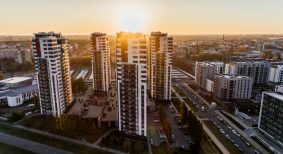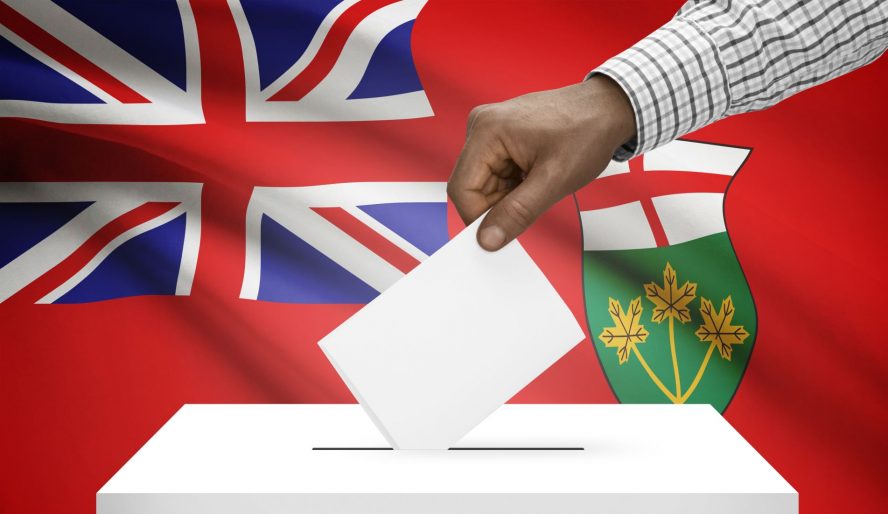It’s official: Ontario residents have voted to re-elect Doug Ford in the 2025 provincial election, securing a historical third term and majority win for Ontario’s Progressive Conservatives (PCs). Ford’s re-election comes amid trade tensions between the U.S. and Canada, spurred by Donald Trump’s ongoing tariff threats on all Canadian imports, including, steel, lumber and oil. In response, Canada has planned retaliatory tariffs on specific U.S. goods. Combined, these measures are expected to significantly impact trade between the two countries and cause inevitable economic upheaval.
 “This election, we asked the people for a mandate,” Ford told reporters from his Etobicoke North headquarters. “A strong mandate that outlives and outlasts the Trump administration. A mandate to do whatever it takes to protect Ontario. Well friends, the people have spoken. They’re ready to stand up for Canada.”
“This election, we asked the people for a mandate,” Ford told reporters from his Etobicoke North headquarters. “A strong mandate that outlives and outlasts the Trump administration. A mandate to do whatever it takes to protect Ontario. Well friends, the people have spoken. They’re ready to stand up for Canada.”
Tony Irwin, President of the Federation of Rental Housing Providers of Ontario issued a statement congratulating Premier Ford and the PC Party on their re-election victory.
“We look forward to continuing our collaborative work with the government on crucial housing policy priorities,” he said. “These include continuing to reform and expedite processes at the Landlord and Tenant Board, streamlining the development approval process and cutting red tape to accelerate the construction of purpose-built rentals, and foster a stronger, more balanced purpose-built rental market that serves both rental housing providers and residents.”
Irwin concluded that he and the FRPO membership are committed to working with Premier Ford to achieve meaningful progress on their shared goals toward building a brighter future for housing: “We are confident that with continued collaboration, we can create more housing options and a healthier rental landscape for all Ontarians.”
The Ontario Real Estate Association (OREA) also issued Ford a congratulatory statement, citing the PC Party’s commitment to investing $50 million into factory-built housing and innovative homebuilding technologies as a driving reason.
“Increased investment in modular, or factory-built homes will help Ontario bring more homes to market, faster, as well as a commitment to standardizing development study requirements and ensuring all municipal standards are in compliance with the Ontario Building Code,” said Rick Kedzior, President of OREA.
As for the election’s impacts on the Ontario political landscape, the NDP Party, led by Marit Stiles, secured enough seats to remain the province’s Official Opposition, albeit with a reduced caucus at Queen’s Park. Stiles, known for her advocacy on education, workers’ rights, and environmental issues, has represented the riding of Davenport as a Member of Provincial Parliament (MPP) since 2018.
“Our job is to hold this government to account, and that is the job we’re going to do with our usual fight and our determination, but also with love and hope and optimism,” she told her supporters after the election.
Ontario Liberal Leader Bonnie Crombie, a three-term Mississauga mayor and former federal Liberal MP, lost to PC candidate Silvia Gualtieri in her Mississauga East–Cooksville riding. Throughout her political career, Crombie has been known to prioritize issues such as urban development, public transit, and community engagement.
Policies that shaped Ford’s tenure
Doug Ford’s housing policies have been a major focus since he took office in 2018. Key initiatives launched under his leadership include the “More Homes, More Choice” plan, which aims to reduce red tape and streamline the development process in order to speed up housing construction. In November 2022, his government passed “Bill 23 – More Homes Built Faster Act” to further accelerate the construction of new homes by reducing development charges and allowing for more density in certain areas. This legislation also includes provisions to protect tenants and promote affordable housing.
But not all Ford’s policies have garnered support. In 2022, his plan to open up parts of the Greenbelt for development was widely criticized by multiple stakeholders, including citizens, municipalities, environmental organizations, and Indigenous communities. As a protected area rife with farmland, forests, wetlands, and watersheds, critics argued the plan would inject unwanted urban sprawl into the region, further arguing that the government didn’t adequately consult with the public before making key decisions. Additional allegations that certain “well-connected developers” stood to benefit financially from the plan, raised concerns about transparency and fairness in his government’s decision-making process. On September 21, 2023, Ford reversed his controversial Greater Golden Horseshoe plan, stating, “I made a promise to you that I wouldn’t touch the Greenbelt. I broke that promise. And for that, I’m very, very sorry.”
Affordable Housing Initiatives
Since 2018, Ford’s government has remained considerably focused on increasing affordable housing, investing in programs like the Building Ontario Fund and the Municipal Housing Infrastructure Program. That said, these policies have sparked some controversy, with supporters arguing they will help address the housing crisis and critics claiming they don’t go far enough to improve affordability or prioritize the environment.
With the average cost of a house now considered out of reach for the majority of Ontario residents, and rents hovering at historic highs despite continued efforts to tackle restrictions to development, housing advocates are calling for more reforms in the future to address high development charges, restrictive zoning, and labour shortages. According to a recent survey from Rentals.ca, 84 per cent of Ontarians said affordability has worsened in the last five years due to issues such as economic instability, lack of housing, and government inaction and ineffective policies..






